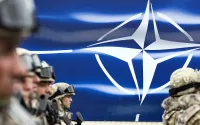25 July 2006Dan Robinson
Prime Minister Maliki's address comes amid the latest insurgent bomb attacks in Baghdad and elsewhere in Iraq, a situation he and President Bush agreed at White House talks requires redeployment of U.S. troops already in Iraq.
As with past speeches by leaders of countries the Bush administration describes as being the front lines in the war on terrorism, he is expected to express gratitude for the efforts of U.S. soldiers in Iraq, at least 2,500 of whom have been killed.
Senator Jack Reed says he expects to hear other things from the Iraqi leader as well. "I think he has to demonstrate his toughness, both politically and militarily to deal with the militias, to deal with reforming his own government, like the facilities protection services, that is something he has to take on. He has to be committed to establishing with our assistance a government that is capable and not corrupt and he also has to indicate and signal that he is willing to truly have reconciliation with all the parties, particularly Sunni elements," he said.
But when he faces a joint gathering of the House and Senate, Prime Minister Maliki will also confront displeasure over his recent comment regarding the conflict between Israel and Hezbollah fighters in Lebanon.
In a letter to the Iraqi leader, Senate Democrats say they are troubled by his July 19th remark in which he condemned what he called Israeli aggression.
Senate Democrat leader Harry Reid says he should use his speech to clarify his remark. He was joined by Senator Richard Durbin. "We hope that Prime Minister Maliki, if he is going to stand before us speaking to a joint [meeting] of Congress, will make it clear that he condemns terrorism not only in Iraq, but also when it comes to Hezbollah," he said.
Democrats in the House of Representatives urged the Republican leadership to cancel the Iraqi leader's speech unless he apologizes for his remark and another by the speaker of the Iraqi parliament.
House Minority leader Nancy Pelosi says Prime Minister Maliki's failure to use a White House appearance Tuesday with President Bush to retreat from his remark about Israel makes it inappropriate for him to receive the honor of addressing Congress.
National Security Adviser Stephen Hadley urged lawmakers not to miss the opportunity to hear from the Iraqi leader about his government's plans. "I just hope that [with] this discussion about Lebanon as important as it is, we don't lose the opportunity to hear from this man about his plan going forward on such an important issue," he said.
Meanwhile, four House lawmakers just back from the Middle East say moderate Arab governments must help efforts for a solution to end fighting in Lebanon.
 |
| Rep. Pete Hoekstra (behind microphone) with Dennis Hastert (right) and other lawmakers |
In a new report, a Washington-based research group The Center for American Progress says the Bush administration's failure to stabilize Iraq has diverted U.S. attention from other trouble spots such as Afghanistan and North Korea as well as Iran.
In his remarks Tuesday, Senator Reed called the report "sobering," saying the war in Iraq is endangering the flexibility of the U.S. military to respond to other crises.
http://www.voanews.com/english/archive/2006-07/2006-07-25-voa70.cfm?CFID=113519728&CFTOKEN=17659070






